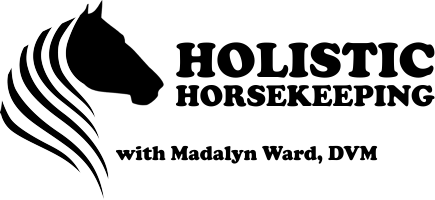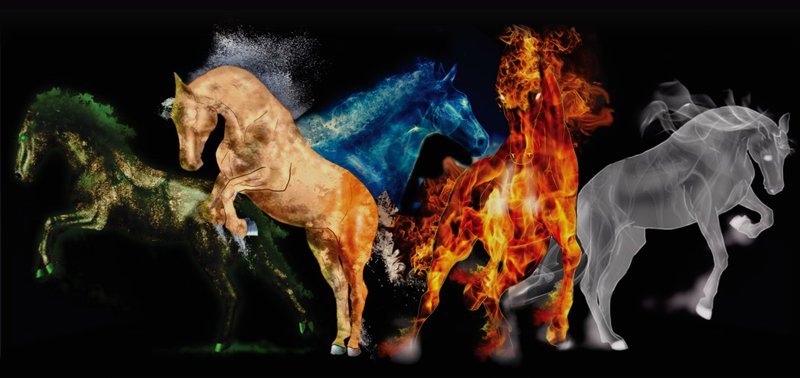June 2021
Holistic Horsekeeping
How to have a healthy happy horse.
Volume 26, Number 6
=*=*=*=*=*=*=*=*=*=*=*=*=*=*=*=*
In This Issue:
1. Horse Symptoms: Early warning signs of EPM
2. Develop a Better Relationship with Your Horse
=*=*=*=*=*=*=*=*=*=*=*=*=*=*=*=*
1. Horse Symptoms: Early warning signs of EPM

I have come to look at EPM in the same way I look at worms – the organisms are in the
environment all the time but some conditions make a horse more susceptible to them. Like other parasites, the EPM protozoa causes more harm in a host with a weakened immune system. The EPM organism enters the body through the gut wall and then attacks the outer covering of the spinal cord. Keeping your horse’s gut wall healthy and watching for the early warning signs of EPM help you prevent serious damage to the nervous system from the protozoa.
The EPM organism affects the sheath protecting the spinal cord so inflammation occurs when this covering is damaged. Inflammation in the nervous system can be very mild in the beginning stages and may only show as loss of the muscles of the top line of the horse. This would be a concern especially in a well conditioned horse that begin to look drawn in behind the withers and along his backbone. The quadriceps muscle right above the stifle can also look sunken in. When the muscles of the horse get weak he has trouble performing basic maneuvers such as walking in a straight line or taking a certain lead at the canter. Increased sensitivity around the poll and unexplained spookiness can also be early warning signs of EPM.
Horse Symptoms: Early warning signs of EPM
Loss of top line muscles
Sunken in muscle above the stifle
Inability to stay straight when walking
Trouble with leads
Sensitivity around the poll
Unexplained spookiness
Keeping the gut wall healthy is your first defense against EPM. A healthy intestinal lining will be a barrier against protozoa entering the body. Prebiotics, such as Immunbiome G_Tract and Algae plus Probiotics will feed the healthy bacteria in your horse’s intestine. Healthy bacteria aid in digestion and fill in all the spaces between the finger like villi in the wall of the intestines. If your horse is not digesting well then the food will sit in his intestine and rot. This rotting food is very irritating to the gut wall. Digestive enzymes help the body break down food when the horse’s body is not producing adequate enzymes or much of his food is hay or formulated feeds.
Stress also contributes to poor digestion. If your horse is concerned about something his digestion will slow down. Even hard training can worry a horse enough to affect his digestion. Some horses will show their concern by acting out in the stall or during training but others will hide their feelings so don’t think that just because your horse is quiet that he has no problems.
Even when you do everything you can to make your horse comfortable he may still occasionally get stressed. If your horse does not greet you every day looking bright eyed and bushy tailed you may want to put him on a product called Focus. Focus is a hemp product to help rebalance the stress hormones.
At first stress may just slow down the digestive process but over time the chronic irritation of poorly digested food can lead to ulcers. Once ulcers develop in the gut wall the EPM organism has no problem getting into the body. Gastro PLUS Pro can help get circulation to the gut. Lean Muscle will help heal and protect the lining of the gut.
Horse Symptoms: Preventing EPM
Feed prebiotics to feed the healthy bacteria
Feed digestive enzymes
Avoid stressing your horse above his abilities
Focus Hemp to help combat stress
Keep you horse in as natural a setting as possible
Treat for ulcers if you suspect them Treatment for EPM can be done with herbal products if symptoms are recognized early. The drugs on the market are very toxic and can have serious side effects. A valuable product to help a horse recover from EPM is Spine and Nerve. This product contains lion’s mane mushroom for nerve healing.
Horse Symptoms: Treating EPM
Spine and Nerve Preventing EPM is far superior to treating it after your horse shows symptoms. Keeping your horse’s gut healthy and lowering the stress in his life are important to keep his own immune defenses strong. If you do detect what you suspect may be the early warning signs of EPM it is better to be proactive with safe herbal supplements.
2. Develop a Better Relationship with Your Horse

By learning about your horse’s temperament type, you can develop a better relationship with and understanding of your horse. We have lots of resources to help you discover what type your horse is and what the special needs of that type are. You will find lots of information on the Horse Temperament website, including an online course, help from temperament consultants, balancing formulas, and books/audios. Then check out the “5 Element Personality” sections of articles on our blog and the Intro to 5 horse types and temperaments on Holistic Horsekeeping.
++++ Copyright | Getting On and Off the List ++++
Unless otherwise attributed, all material is written and edited by Madalyn Ward, DVM. Copyright (c) 2021 HolisticHorsekeeping.com and Madalyn Ward, DVM. All rights reserved.
If you like the material in this newsletter please let your friends know about it. You may reprint material in other electronic or print publications provided the above copyright notice and a link to http://www.holistichorsekeeping.com is included in the credits.
You can get off this list by sending an email to info@holistichorsekeeping.com.
When you forward this material, please send the entire newsletter. Thanks!
Please also enjoy all of Dr. Ward’s web resources:
http://www.holistichorsekeeping.com
http://www.horsetemperament.com
http://blog.horseharmony.com
https://www.facebook.com/HolisticHorsekeeping
https://www.facebook.com/HorseHarmony
Twitter: madalynward